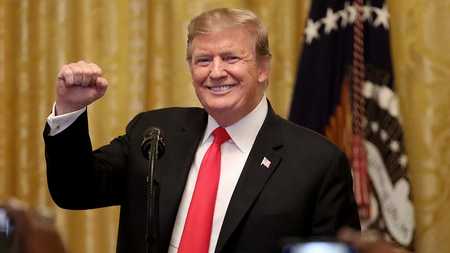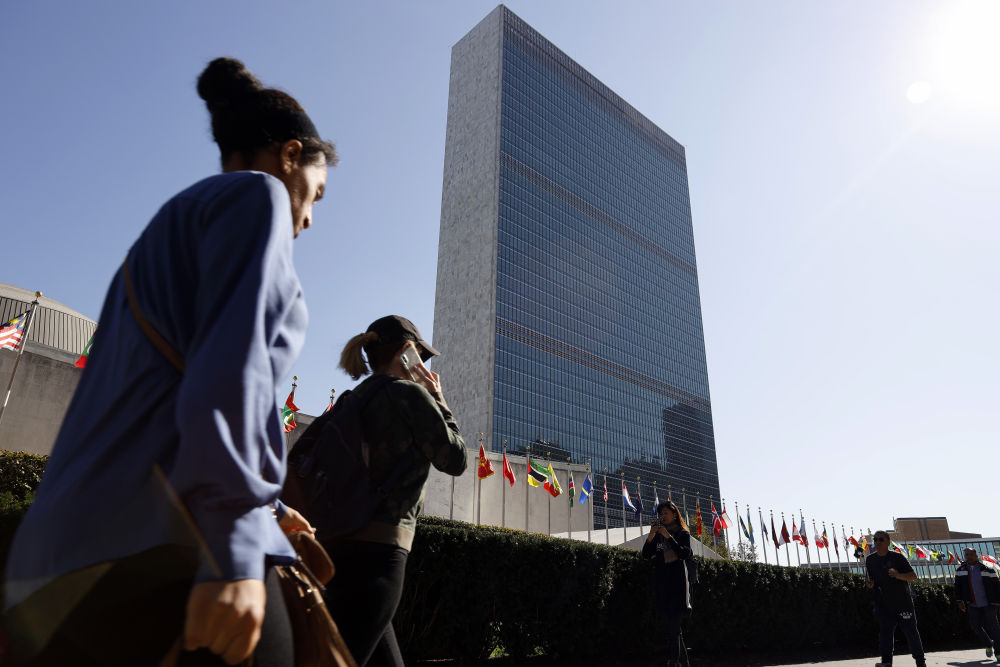
Editor's note: Mike Cormack is a writer, editor, and reviewer, mostly focusing on China, where he lived from 2007 to 2014. He edited Agenda Beijing and is a regular book reviewer for the South China Morning Post. The article reflects the author's opinions, and not necessarily the views of CGTN.
"The China virus."
"Kung flu."
"The China plague."
Donald Trump's penchant for bullying nicknames is well known. His opponents in the Republican primary got a taste of them: Jeb Bush was "Sleepy Jeb," while Ted Cruz was "Lyin' Ted." And, of course, since then we've had "Shifty Schift" and "Crazy Nancy." These are two of the most senior politicians in the U.S., taunted as though in the schoolyard.
But there Trump was on September 22, speaking in a pre-recorded message from the White House to the General Assembly of the UN. It is no raucous campaign rally: no chants, no red hats and no wild accusations and careening off-the-cuff speech. An August gathering, to be sure, with statesmen and women, diplomats and high-flying civil servants.
There, even when countries have tough messages to impart, they generally (with the exception of Nikita Khrushchev, who banged the desk with his shoe) do so through the politesse of diplomatic code. Such subtlety of language ensures messages are received but acknowledge the fact that countries have to coexist. Today's enemy might even be tomorrow's ally. Every diplomat knows that a nation's friends are transitory, but its interests are eternal.
But you can't polish Trump. He has neither any interest in persuading others nor a comprehension why this might be important. This is not a man who understands decorum, or who has the self-awareness to seek it. (The videos of his minor indignities – his wife refusing to take his hand, other leaders rolling their eyes as soon as his back is turned, being dressed inappropriately for the occasion, or wandering aimlessly after speaking to reporters – are countless. To think we once laughed at George W. Bush for trying the wrong door).
Nor can Trump accept blame. And so rather than face up to his many failures in handling the pandemic, he sought to place the sole blame on China, and to gather support for his attempt to do so. Other nations "must hold accountable the nation which unleashed this plague on to the world: China," he said.
But his strategy was utterly transparent. With the U.S. having one of the worst per capita death rates, a second-wave of infections in full swing, and a death count in excess of U.S. wars in Korea, Vietnam, the Persian Gulf, Afghanistan, and Iraq, Trump's calamitous management is only too obvious.

The UN headquarters. /Xinhua
The UN headquarters. /Xinhua
All people see is him trying to avoid reality. On January 20, as the U.S. recorded its first case, he said, "We have it under control." On February 26, he claimed, "Within a couple of days it's going to be down to close to zero." On May 11, he said – as the death toll hit 80,000 – "We have met the moment, and we have prevailed."
And on July 19 he said, "I'll be right eventually. It's going to disappear, and I'll be right." The truest statement he made was on March 13, when he said, "I don't take responsibility at all."
Hence, like a Trump University degree, no-one at the UN was buying what he was selling; there were no rubes to sell to. All he had left in his locker was name-calling. That manoeuvre might work with the baying mobs at Trump's rallies, but at the UN General Assembly it looked tawdry and pathetic. The most powerful man in the world was reduced to this.
The thing that puzzles about Trump and his acolytes is how people fall for their masculine posturing. Trump advisor Sebastian Gorka declared, the month after the presidential election victory, that "The alpha males are back." Trump's absurd efforts at dominance when shaking the hands of presidents and prime ministers have been widely noted.
It's no coincidence that he is the only president to have participated in professional wrestling shows (Their combination of posturing, spectacle and aggression are very similar to Trump's rallies).
Yet, the Trumpian manner is petulant rather than manly. It summons images, not of John Wayne or Theodore Roosevelt, but of teens upset at being told no by their parents for once in their lives, or wealthy suburbanites pink-faced and angry that someone else has a larger car or bigger house. "It's not my fault! It's not fair!"
As an outlook, petulance has little to commend. But in a consumer society, where we are all told we are special, someone else has to be to blame for our failures. It might be Trump's genius that he – the arch-narcissist, egomaniac's egomaniac – was aware of the politics of grievances and could meld it into an election-winning force.
But as a governing philosophy, petulance has nothing to say beyond blame-shifting. It's always someone else's fault. That's the entirety of Trump's message. But when the coronavirus pandemic meant he had to lead the nation, he has been found desperately, criminally, lethally inadequate.
(If you want to contribute and have specific expertise, please contact us at opinions@cgtn.com.)